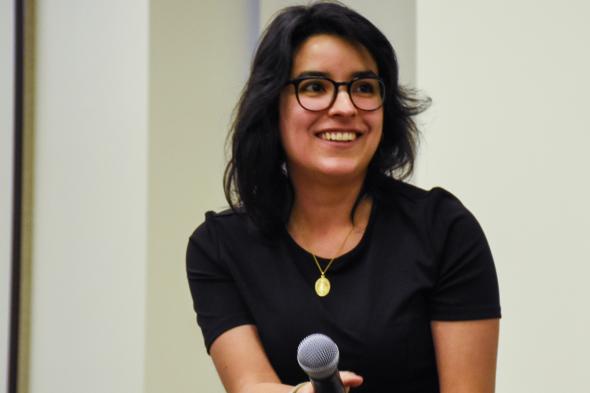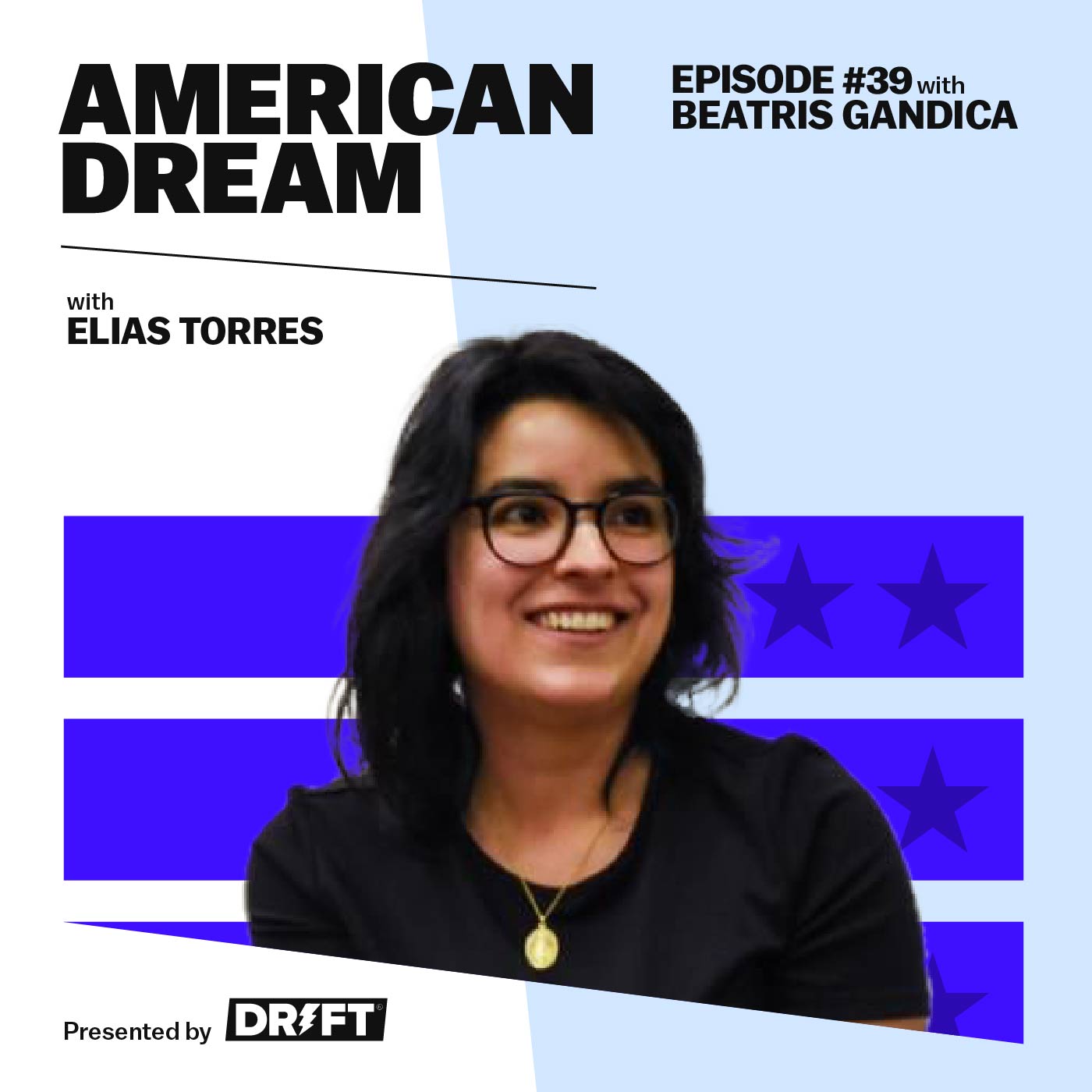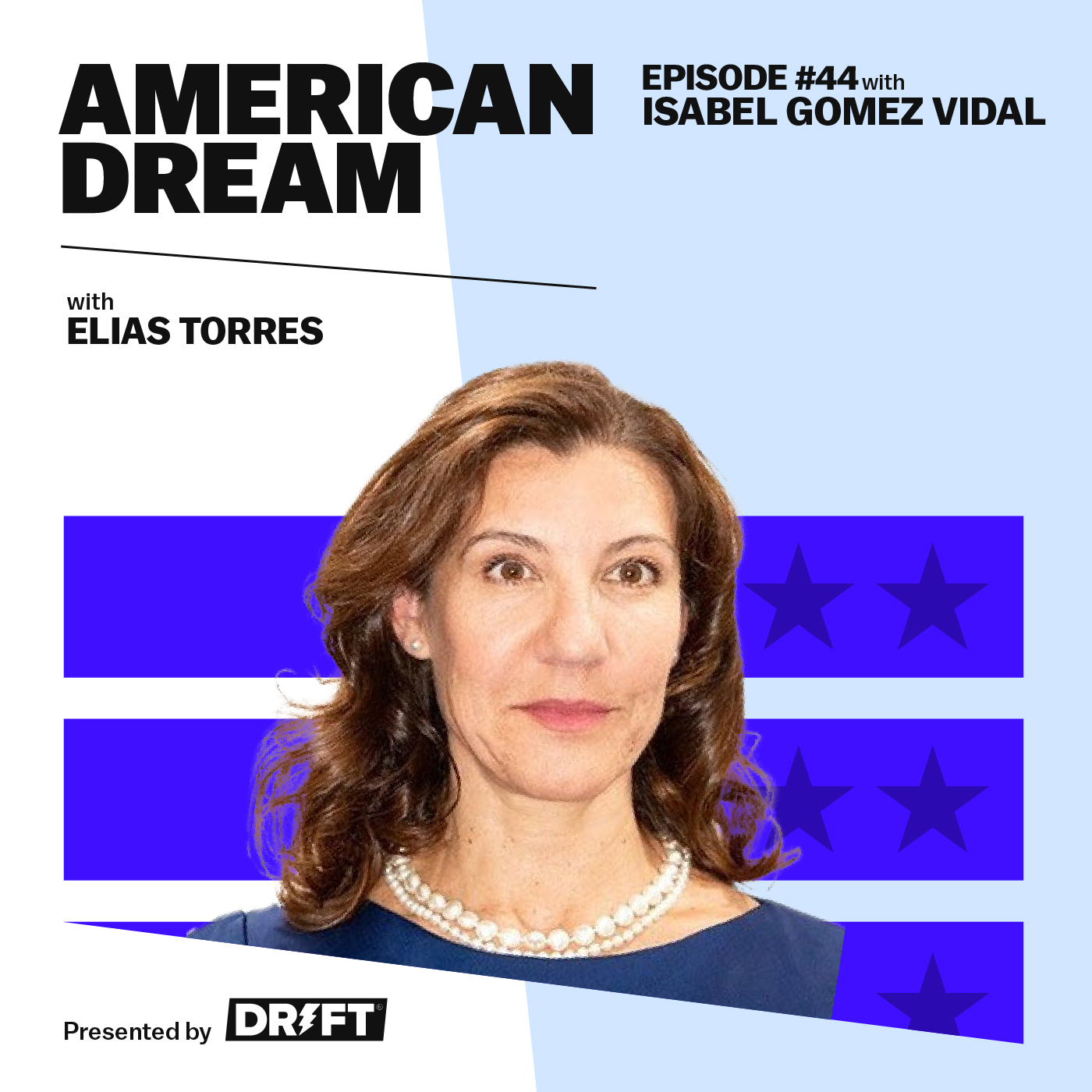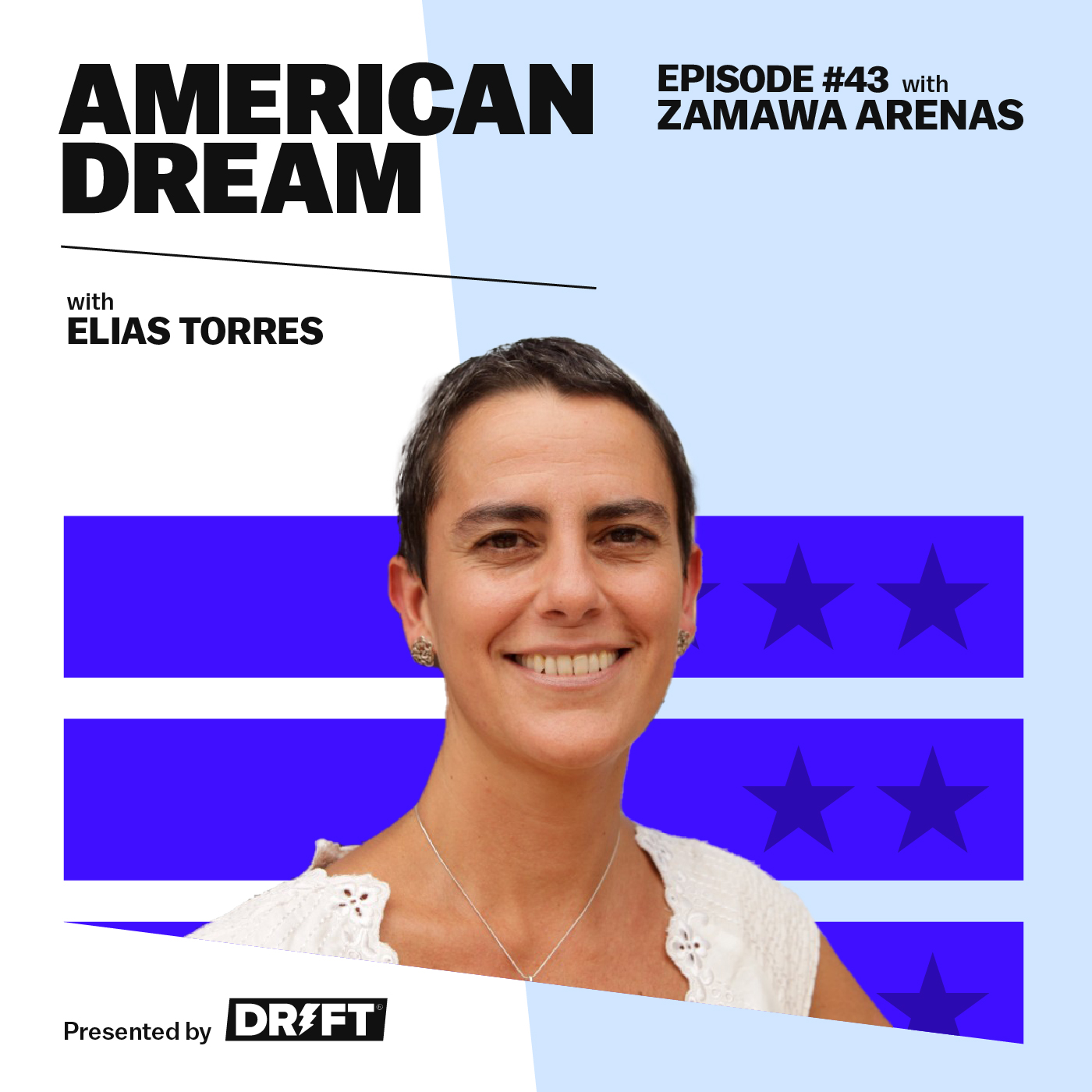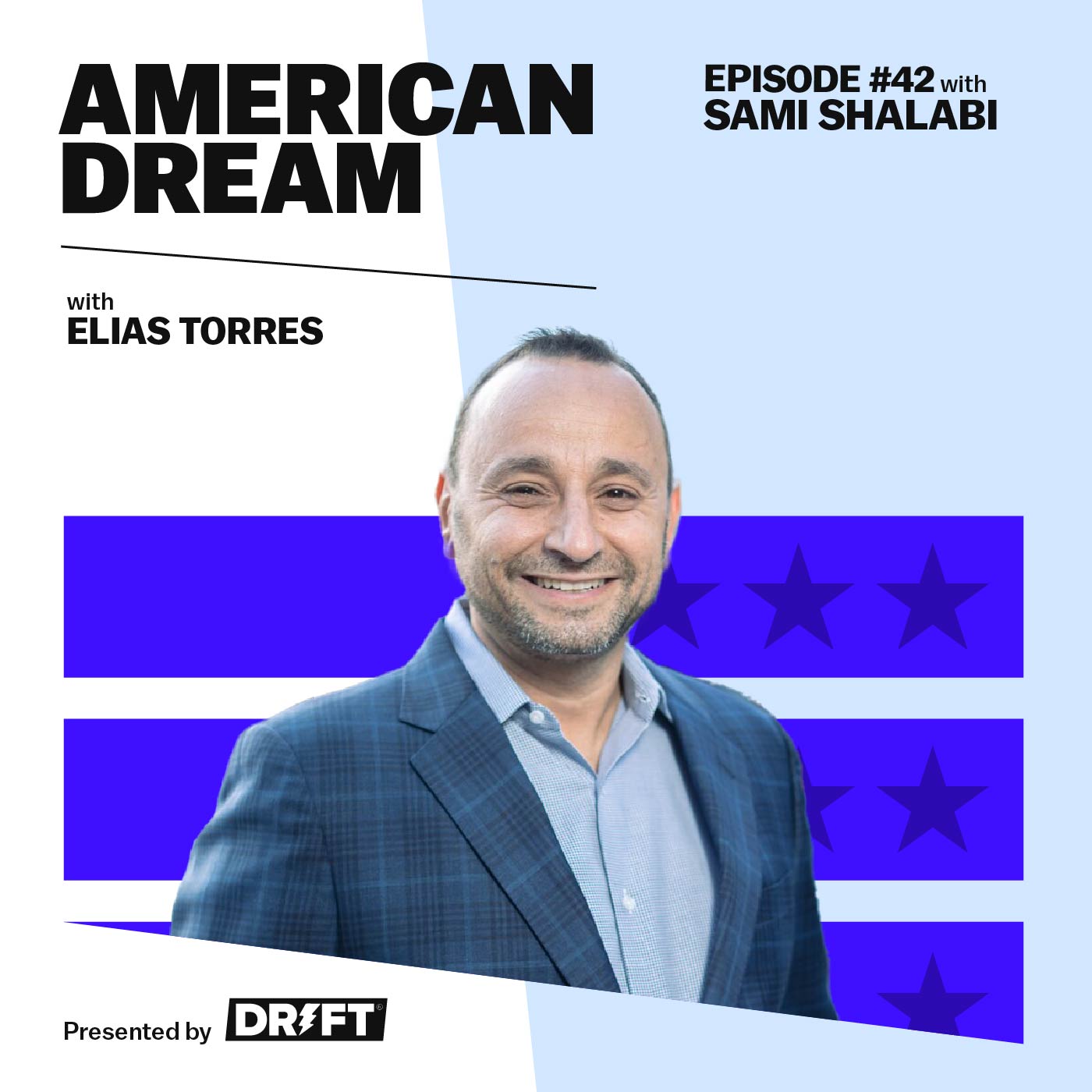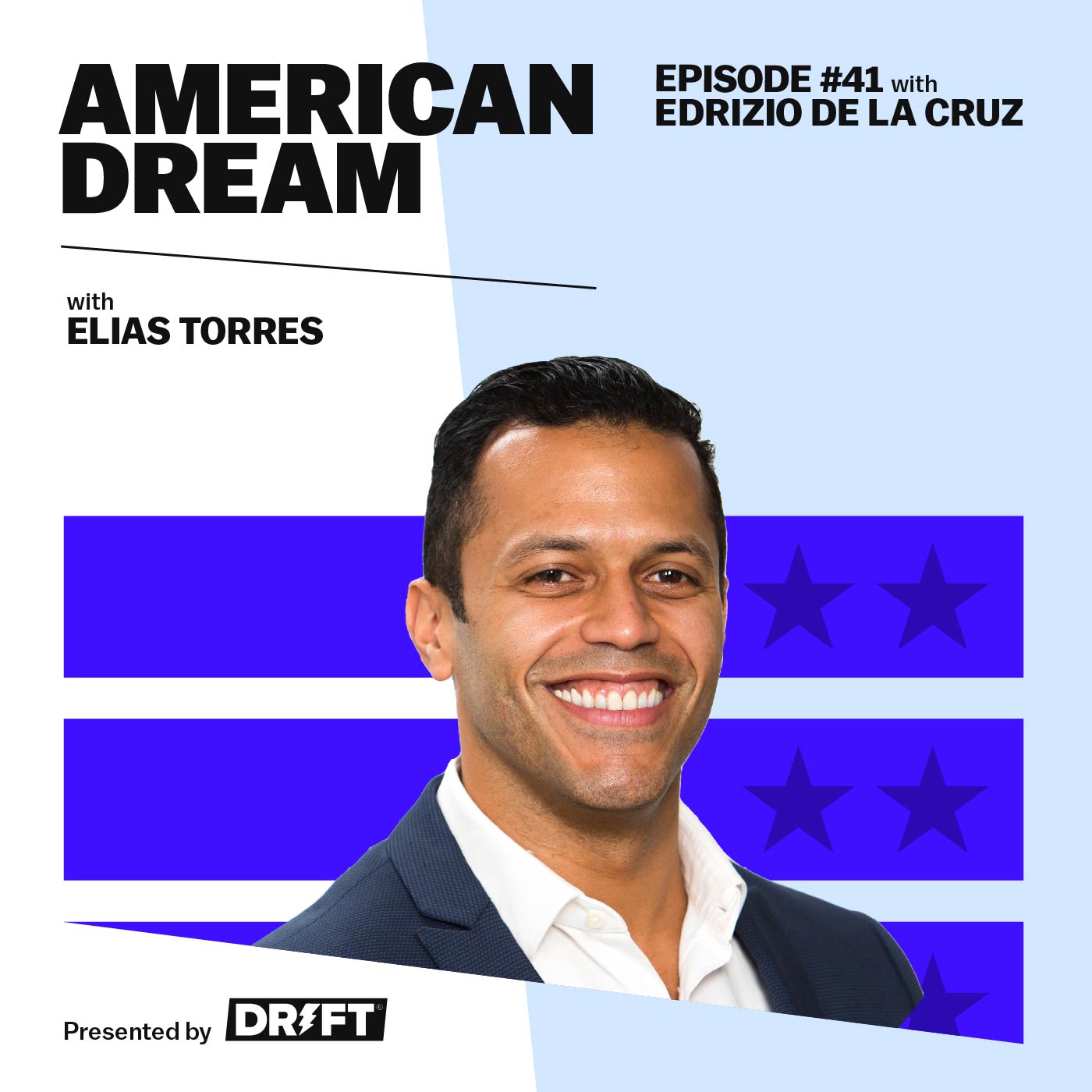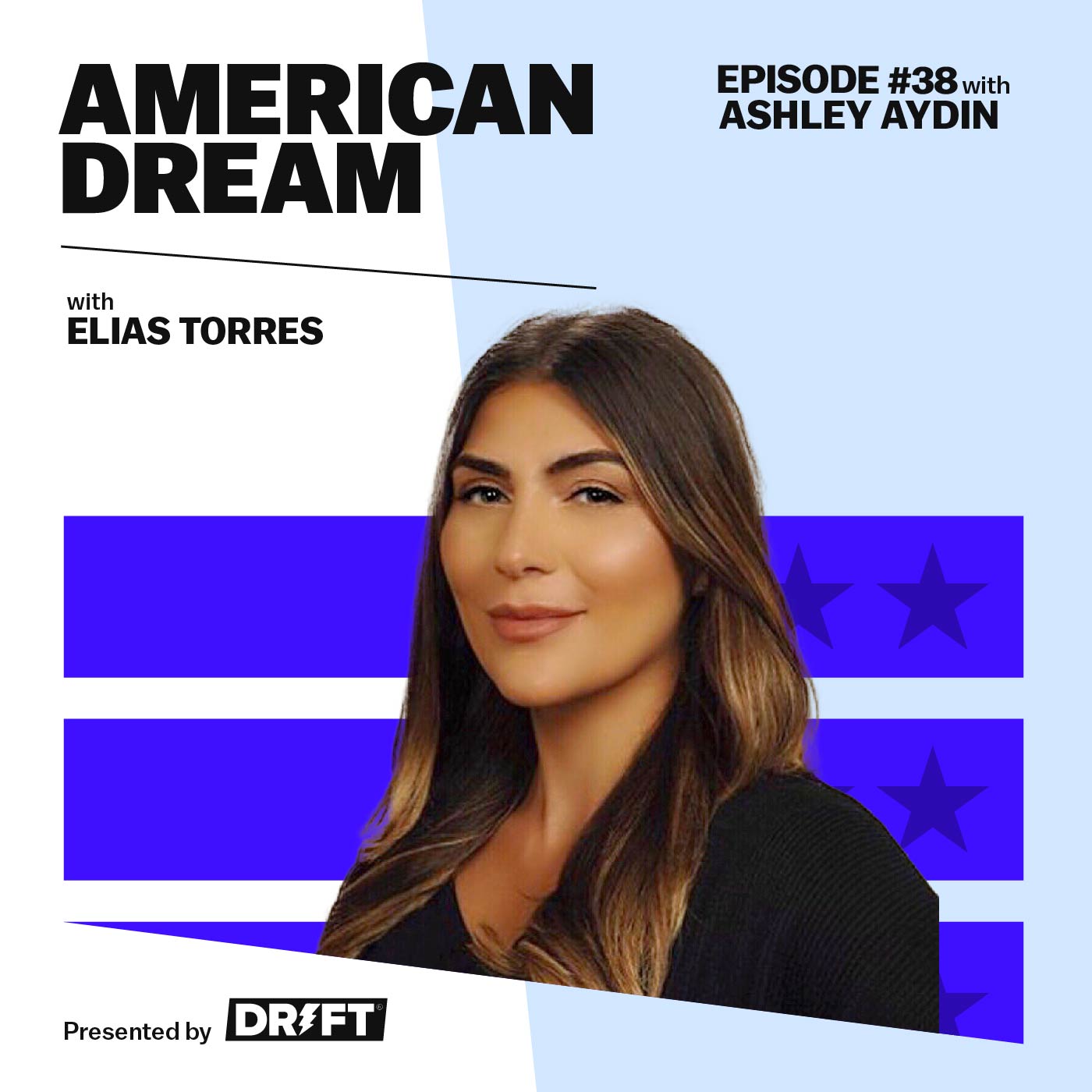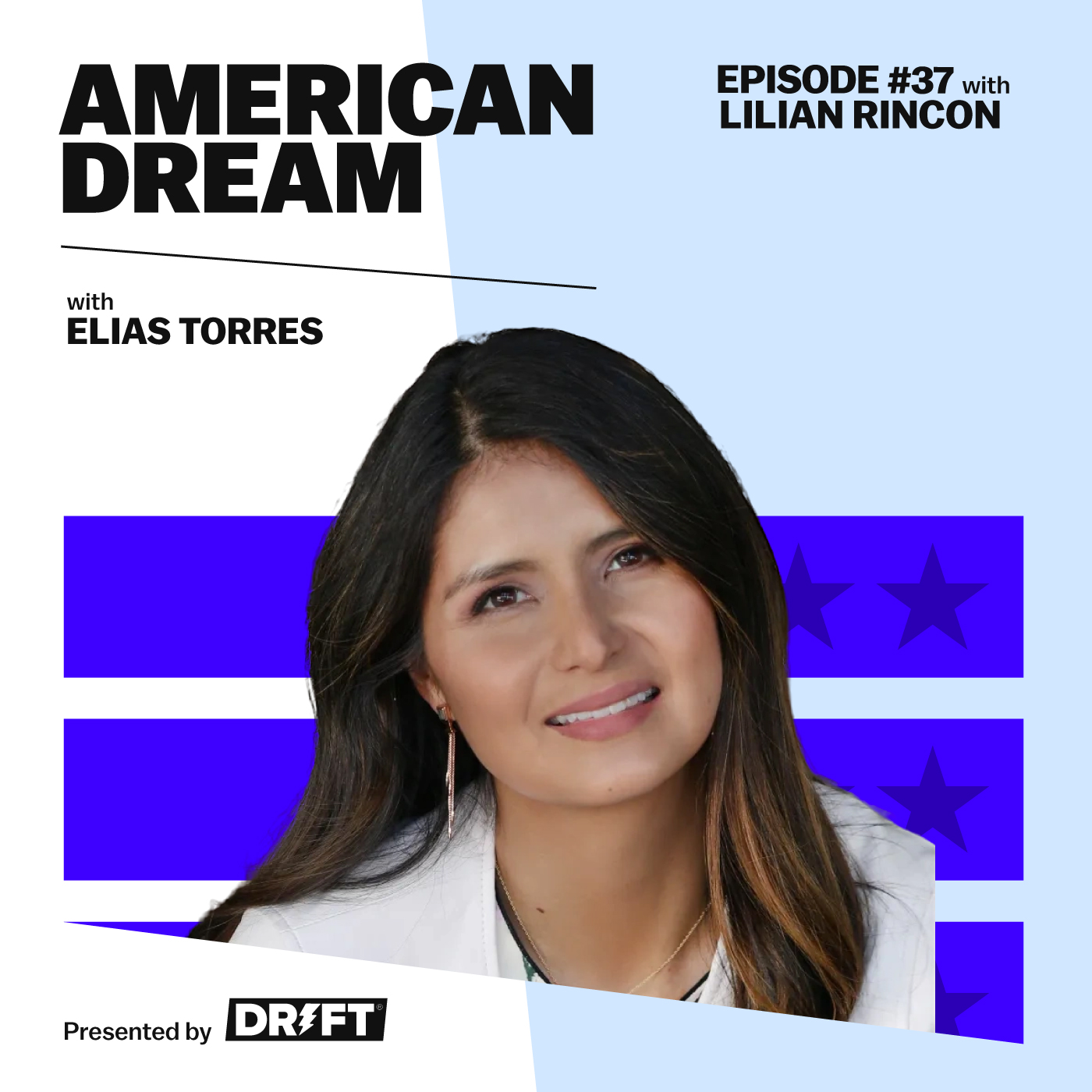How Do We Give Everyone a Chance to Find a Career in Tech? (With Microsoft's Beatris Gandica)
- 0.5
- 1
- 1.25
- 1.5
- 1.75
- 2
Elias Torres: Hola. I'm Elias Torres, co- founder and CTO of Drift. You are listening to The American Dream Podcast. Did you know that Drift is part of just 2% of VC- backed startups led by Latin American founders? Well, I'm on a mission to change that. On this show, you will hear from leaders who have achieved their own version of The American Dream. We'll talk about what the process looked like to get there, the obstacles they faced along the way, and the work we still have to do to build the new face of a diverse corporate America. foreign language to another episode of The American Dream Podcast. Today's guest is Beatris Mendez Gandica, a senior program manager for Microsoft. And the founder of Nuevo Foundation, which is a group of professionals encouraging underrepresented communities to learn more about STEM careers. Like me, Beatris has a passion for getting more underrepresented individuals into tech early in their careers. And that's what we're going to talk about in this episode. Welcome to the show. Let's talk. Thank you for being here.
Beatris Mendez Gandica: No, thank you for having me. I'm very excited. I've seen a lot of your episodes, and how fun you are, and all the stuff that you've done, especially for the Latino community. So I really appreciate it, for giving me the chance.
Elias Torres: I haven't done anything. All I do is, I just work, work, work. And then some people say, " Well, I want to watch you work." I was like, "Okay." So, there's a lot to talk about. I think the meat of it is the Nuevo Foundation, and I think that's what really attracted me to ask you to join us, because it really aligns with my mission. But I want to know... I always love hearing stories, and I think... I don't know, I'm always looking for ways to say stuff that gets me in trouble, but I haven't gotten in trouble yet. But, maybe. I don't know you, I feel like from your career and stuff like that, you come across to me, you're still a young person. You're not like old, like me. And yet, you have a foundation already. And that's just my mind blowing, right? I'm starting a foundation now, but I'm really old. It took me a long time to feel ready to help. And you've done this so much earlier than me. I'm so proud of you and I'm in awe. So tell me, what led you to do this?
Beatris Mendez Gandica: Thank you. Yeah. No, so for me, it has always been ingrained in my family to be able to give back. Growing up... I'm from Venezuela. And I remember my grandpa would take us to the orphanage, to the elderly home, would take us to the church to bring food, to buy their products, to bring in medicines, clothing. And that's something that I just grew up with. So for me, giving back, it's normal. So I did that. And then when I came to school, to the US, in Wisconsin, they had a program where they try to bring folks that come from underrepresented backgrounds into the university. To make sure that they continue their high school education and that they have a chance also, to do that for college. So I did that, and I thought it was super fun. I wanted to see more people that looked like me in college, and I did that. So then I came to Microsoft, and they also have some programs like DigiGirlz, where they bring girls to learn more about tech, about coding. But I was like, " How can I help anybody? It cannot just be, if you are Latina, if you are a female, if you are this, if you are that." I wanted to help the whole spectrum. Because something that I realized is, as a Latina in this country, I want to be included. And if I'm excluding whom I'm teaching, then what is it that I'm doing? So therefore, the Nuevo Foundation come. And Nuevo, for those of you that don't know, means new, in Spanish. And the whole idea was to have a new approach where we help anybody that's underrepresented. That can be in terms of income, that can be in terms of gender, in terms of race, or any other underrepresentation. And that's what we started. So I'm like, "But Beatris, why would you start this thing if it's a lot of work? It's a nonprofit, you don't have money, where are you going to get the funds?" All the stuff. And there's this saying that, I would say like, foreign language. With little that you have, you make the most that you can. And we just came with this idea. And it was five friends at a cafeteria here on campus, at Microsoft. And I'm like, " Look, I learned how to code in university. I think it's too late, by comparison, with other regions of the world. How can I give the chance that I didn't have, to that kid in Montana, Idaho, Seattle. That they can do too, through coding?" And so we were like, " Okay, well there's already plenty of organizations that do the same. Let's see if we can do it." And our target was, " If we can help 500 kids in the first year..." This is 2018. " This will be a success." And before the end of the year, we were able to help over 2, 000 kids. And so, there's still a gap, there's a need. And that's how it started. Sorry, if I speak too much, you can always stop me. But, that's what came to mind with your question.
Elias Torres: No, no, no. I normally speak too much, so what I try to do in these episodes is try to not say anything. And the good thing is, because I interview a lot of Latinos, they just talk a lot, so I don't have to say much. In Drift, at my company, we call that the Drift Leadership Principle. Staying scrappy, right? It's something that... I love that it's built- in. It's taught to immigrants, to Latinos. Because we have less, right, growing up? And so, we're okay. But to tell you the truth, there's people at my company that don't like that principle. It's controversial, right? " Should we do things too scrappy? That means they're not well developed. Should we do things properly? Should we be cheap at this stage? Is it cheap, is it prodigality?" Whatever it is. But, I love what you did. I feel like you're very entrepreneurial. I can dig you from working on Microsoft, that's a plus. But the thing is, you went and you said, " Can we help 500 kids?" You set a goal. You set a goal of 500, and you said, " If we do that, that's better than nothing, than not helping anyone." And you helped 2,000. Wow. That's phenomenal. And those kids, maybe it's the first experience ever they had with something like this, right?
Beatris Mendez Gandica: Yeah. So we try to work with Title One schools in the US, which are the schools that are least funded. Let me give you two examples. So we got to a school in Fresno, in California, which is a very rural area. So it was funny, because mostly Latinos. But then they brought not only their sister, or their siblings, but they brought foreign language. It's like a family. There would be like 10 people. They all come to this big conference at the University of Fresno, and it was the first time that they see a Latina that works for a big tech, or for a good company, or is making more than what they think that they could make in their life. And I think that exposure is very important. And so, that's what we try to do. We've done the same in Wisconsin. We do the same here in the state of Washington. Massachusetts, where you are, not yet. Hopefully soon. But the idea is, " How can we help all those-"
Elias Torres: It's too cold here. It's too cold.
Beatris Mendez Gandica: It's too cold? I bet, I bet. But it's giving them that exposure. That, " Dream big. It's possible. Keep studying. Learn something. Find your passion. And if coding it's not, that's totally fine. But at least you know that there's this thing called computer science, there's this thing called tech, coding. That, if you want to, if you choose to pursue that, you can make a living and hopefully help your community." Because everything is pay it forward, right? " I've learned. I'm here. How can I give back to the next person? And the next person to the next person?" And when we teach, we always tell the kids, " Hey, you have a cousin, you have a sister, you have somebody else. Would you teach the coding that you learned today, to see if that person might like it?" And I think that's important. Because, unfortunately, in the education system in this country, and anywhere in the world, there's so much disparity and such gaps. That we just have to do, like a snowball. We try, and then hopefully the word gets spread, and kids have more opportunities.
Elias Torres: I love listening to you. That's awesome. It's like, I always complain that I feel like I don't know where I belong, because I get to interact in different groups in different places. I'm always shifting and moving one foot here, one foot there. But I like this intersection of, Latinos, Latinas, and tech. And you're like, " foreign language." It's that Latina hustle. But saying, " Computer science and tech." And teaching them, and inspiring them, and working in big tech. And making money, too. We've got to make money. We've got to teach them how. I think it's pretty clear, I love the clarity of the mission. I'll give you a challenge. If you come to Massachusetts, you're organization, give me a heads- up, and I'll go with you.
Beatris Mendez Gandica: Yes, yes. Definitely. We'll do that. Because one of our goals is, " Can we have at least a school or a partner in every state of the country?"
Elias Torres: That's the next one, 50 partners?
Beatris Mendez Gandica: Yes, yes. That's the goal. We're not there yet. But also with the pandemic, what happened is, we were able to scale... Or, I don't know if scale is the right word, but spin. Because we were able to teach in South America, in the Caribbean. Which, otherwise, we wouldn't have been able to. Because kids were taking classes online. And so, I understand a lot of setbacks happened because of that. But one good thing that happened is, first, it let us go, or spin, in different countries. And also, kids in the US, regardless of where you are, they were given computers and internet access, which was a problem pre- pandemic. So that, for education and outreach for us, was big.
Elias Torres: Was big. No, absolutely. And what do you teach?
Beatris Mendez Gandica: Okay, so we have about 33 workshops in multiple languages. So in Spanish, Portuguese, English, German, French, and other languages as well. But we teach Python, HTML, JavaScript, Java, C ++, C#, and Security. I might have missed one of them or not, but that's what we teach coding wise. And then, especially with the little ones, like elementary kids, we try to do things that are more hardware related. So, block coding. So for example, we have a workshop that's super popular with the little kids. That is, we use an Adafruit, which is something about this big, like very small. You connect it. You code it with block code or JavaScript, depending on what you want. And we plug in two oranges. And so, every time the kid touches the orange, it makes a different sound. And there's some light up things. And so we're like, "You can do this with bananas, too." And the kids just lose it, right? Because, " How come you can make a food, make a sound?" And so that is just because, what we notice is that, when we work with small kids, it has to be hands- on. If you just come and tell them about algorithms and all that, it's not going to work. And we don't even talk about algorithms unless we're teaching advance. Because for us, it's like, " Hey, we have this story. How you would create a square? How would you do a hexagon? How you would build your own honeycomb?" And stuff like that. That way it's more a fun story mode, versus just like, " Hey, this is Hello, World. Now, we're going to make a function." Type of thing.
Elias Torres: Yeah. No, that's hard. To tell you the truth, I was always concerned, as a parent, what I was going to teach my kids. Having a rough upbringing, I saw the affluent parents in Massachusetts, which is, send them to lessons, this and that. Dads that were craftsmen. They would build things or repair cars. And so I was always like, " Holy shit, what am going to teach my kids?" Right? I didn't know what to. So I thought, " Well, you know what? I'm going to make them programmers." I thought I was going to do this. And I didn't do too good of a job, because I ran into those problems of like, " What is the right thing to teach and expose them at the right age, that would click?" And so, it was not an easy thing, " What is right?" So, I love what you're doing in terms of your findings. So, did you realize you were an educator?
Beatris Mendez Gandica: So both of my grandmas were teachers when we were growing up. So I think that has a lot of influence, because I always have my regular school homework, and then I have my grandma homework. And then I could go out and play. I love sports, so I would go out and play kickball. Or just by my own, throwing the ball against the wall and stuff like that. But I had to do extra homework, always. So, I don't know. Maybe inside of me, just many years of my grandma. So, I had a grandma... They're still alive, sorry. I still have a grandma. But one grandma was like a real grandma. You know, you will bake, and do nice things and all this stuff. And my other grandma was military. Like, " Boom."
Elias Torres: Was a fake grandma.
Beatris Mendez Gandica: Yes, exactly. I love her to death, but that's just how she was. She was like, " You've got to..." If they're asking you to do one, two, three, you're going to do one through six. And I never understood that, " Why?" Obviously as a kid growing up, it sucks. Because you want to go out and play with your friends, you want to play Nintendo, or anything that you want to play, or play outside. But, I have to do extra. But after the years have passed, I'm super thankful. Because that resiliency, or that giving more than what you asked, I think is what has helped me in my corporate job. But also at Nuevo, where I have a team that, we have no money, no income, necessarily. But it's, " How do I grow my team? And if I'm expecting my team that's all volunteer to do something, am I an example, that I'm doing exactly what I'm asking them, and more? Because otherwise, how do you expect people to do stuff that you are not doing?" Especially in the nonprofit world. Corporate, that could be a different topic. So I think that that's important.
Elias Torres: I like how you call corporate... Yeah. I'm glad you know it's corporate. What, you didn't get laid off?
Beatris Mendez Gandica: No, no.
Elias Torres: That's a good thing, right?
Beatris Mendez Gandica: Thankfully, no. No. But, I mean, we're living right now in times that, it's rough. There's a lot of folks from Meta that got let go yesterday. Thankfully my two friends, group friends that are there, are good. Another friend at Twitter, she's still good. But yeah, it's unfortunate what's going on right now with the layoff.
Elias Torres: And usually what happens is that, Latinas are the ones that get laid off first, too. So it's a real struggle that I've seen too, up close and personal, to tell you the truth. It's painful. Oh my gosh. I mean, yeah. No, I love... Are you an engineer?
Beatris Mendez Gandica: I mean, I went to school for information systems and I work in engineering. I call myself an engineer, but it depends who you ask. Because some people are like, " Well, if you didn't study engineering then you cannot be called an engineer." I'm like, " Look, that's what I've been doing. If you need the title to claim something, okay, maybe I'm not. But I do engineering work."
Elias Torres: What do you code in?
Beatris Mendez Gandica: So right now in my real job at Microsoft, the nine- to- five... No, my five- to- nine. Mostly, it's going to be right now on Gusto, which is Azure Data Studio. Which is a query language similar to SQL, but it's not SQL. And the majority of the code, when I get to review it, it's going to be JSON and a lot of YAML. So, I love when I see YAML. I really do.
Elias Torres: Yeah. And so, are you doing the more DevOps and stuff like that? And did you do C# and all this stuff, before?
Beatris Mendez Gandica: Yes, in my previous job. Yes, I'm a program manager. But in my previous job I got to check code, because the engineering manager and lead were super cool about it. It's like, " Yes, Beatris, even if it takes you longer, you can still do it." And by the way, the reason I'm saying it takes me longer is because that's not what I do every day.
Elias Torres: Yeah, yeah, yeah. Absolutely. No, you're an engineer. You're an engineer.
Beatris Mendez Gandica: I was able to check in-
Elias Torres: If somebody says you're not an engineer, tell them to fucking call me.
Beatris Mendez Gandica: Okay, sounds good. But yeah, it was C#-
Elias Torres: You're like, " Just talk to my friend." Say, " Talk to Elias." Because I study information systems, right?
Beatris Mendez Gandica: Oh, same. Okay.
Elias Torres: It was management of information systems, that was my degree in Tampa, at USF. And then I showed up like you, at IBM, a corporate job. And I was just there winging it, learning, right?
Beatris Mendez Gandica: Yep.
Elias Torres: And yeah, I took a few classes at this school called Harvard. But the reality of it is, I learned all my programming at work. You know what I mean?
Beatris Mendez Gandica: On your own, yeah. And learning. And making mistakes and learning.
Elias Torres: Exactly. So whoever tells you you're not an engineer, tell them to talk to me. I'll mess them up. This is awesome stuff. So, why are you-
Beatris Mendez Gandica: But for the nonprofit, the coding that we use the most is Python, because I think it's the best to get kids started. When I see some teachers starting kids with C ++, or C#, I'm like, " I get it. I can understand, because maybe that's what they learned."
Elias Torres: What about JavaScript?
Beatris Mendez Gandica: We have done JavaScript. The thing is, right now we have an issue. Which is, in order to use an online IDE, because the majority of the kids have Chromebooks, you cannot install VS Code, or anything like that. You need to have an email address that lets you run JavaScript, to use. We use a company called Replit, and you just can do stuff online. But the problem is that, if the kids are under a certain age, they cannot have email address unless you get the parents' permission. So we get some limitation of what we're able to teach. And Python, there's this... I don't know if they're a nonprofit, or for- profit. But they're called Trinket. And you can run without any email, and so that's where we try to go more. They don't have JavaScript yet, but once they do, we have a workshop to teach the kids how to do... You know the Sappy Bird, Flappy Bird? So we have one that we call JS Sappy Bird. So they do the same game with JavaScript, and they program how fast, what color, what level, the kids get to do.
Elias Torres: It's funny you mentioned Flappy Bird, because one of the things that I did... I'm not good at teaching kids. I'm more like, I just like to have fun. I'm more like, lunches, potlucks, parties. I'm good at those with the kids, and teenagers, and stuff. So my kids like hanging out with me, because I... But what I did with my daughter and my kids, I said to them, " You cannot get a phone unless you build an iPhone app."
Beatris Mendez Gandica: Nice. Nice.
Elias Torres: So the first two built one. My daughter built a Flappy Bird clone, but she called it... I think it was Blue Jelly. Blue Jello, or something. Blue Jelly. But it was a jellyfish in the ocean-
Beatris Mendez Gandica: Nice.
Elias Torres: And so you had to go like this, and there was coins that you'd collect. And if a shark touched you, then you would be dead.
Beatris Mendez Gandica: Okay. That's awesome.
Elias Torres: So she built the game, published the app, installed it. And then I gave her a phone.
Beatris Mendez Gandica: That's what we do. We try to talk to the teachers and say, " Look, what is your class mostly into? Are they into music?" So we have a workshop for music. " Are they into design drawings?" So that's why we do the HTML and CSS, because you have the most freedom. " Are they into gaming? Are they into security?" And based on that, we try to approach that, just to make sure that the kids will find it interesting. Because it depends on your interest. If you are not into music and I'm going to teach you how to make music, I don't know how much impact it can have in that hour, or that hour and a half, on you.
Elias Torres: No, I agree. No, it's tough. It's tough to personalize it, but I like what you're doing. You're creating different modules that could effect every kid differently. So, how long have you been doing this?
Beatris Mendez Gandica: So we started in 2018. In April, we've been able to serve 33 countries. The last country we added was Togo. That was very interesting.
Elias Torres: I don't know where that is.
Beatris Mendez Gandica: Togo is in Africa and they speak French. And so we're like, " Okay, I don't speak French." So one of our awesome team members and lead, he's from Canada, from the British Columbia side, but he learned French. And so I'm like, " Oliver, do you think you might be able to teach in French? Or at least certain words?" He ended up teaching all of it in French. It was amazing. And then certain things happened back in our countries, like the electricity went out. It was the first time for the kids, that they touched a computer. Not all of them, but some of them. But it was so beautiful that, at the end, they all got to build their own website. Their first time touching a computer, and already doing HTML and CSS. I just think that that's amazing. And hopefully, we can continue to partner with that organization in Togo. And anywhere in the world. Because to us, it doesn't matter where you are. If we can connect virtually on a time that's not like 3: 00 AM, or something like that, we'll make it work. And then, we've been able to help almost 14, 000 students so far.
Elias Torres: So you get these kids into tech. How do you get them to stay?
Beatris Mendez Gandica: Yes, so our job is-
Elias Torres: I'm not trying to give you more work, because this is a hard problem. I'm just happy for you. You're doing something very, very nice.
Beatris Mendez Gandica: Yes. So our goal is to, ideally in middle school... And the reason why we target middle school kids is because there's research based by NCWIT, the National Center for Women& Information Technology. Where they have found out that, especially girls, when they go from middle school to high school, they lose their interest in STEM. So we try to teach middle school the most, just to avoid that loss of interest. And for us, if the kid or the student is into coding because of the resources, because of the opportunity, because of what they see, that's amazing. Now, do we keep track of the students to see if they remain in tech? That's something that legally, we cannot do, because you cannot keep track of the kids. So what we do is, we work with the teachers, we work with the schools, and try to make sure that, " Hey, can we teach the same class again? Do you know if they went to university? If they graduated?" But it's not... I mean, as an engineer, I would love to have a data point of how many of those... 13,700 or something like that, that's the number. How many of them actually are coding after a month, after three months, after a year. But we do get some outliers that write us and say, " Because of you, I'm now going to be an engineer." Or, " Hey, I'm planning to go to college. And one of the reasons that I want to go into computer science, or at least try it, is because I had a Nuevo Foundation event two years ago." Those messages happen. And when they happen, it's the best feeling in the world that you can have, because one hour can change somebody's life. But I don't necessarily... I can't keep the track. What we do sometimes is, work with other organizations that focus on that type of mentorship once they're in college, and we try to give some talks based on our experience. But it's not part of our core. Our core is virtual sessions. Sharing how we got to tech. And 15 minutes, where the kids get to ask questions. Coding workshops. And then Speaker Series, which is at an auditorium, or a big event that somebody's putting together. But it's not necessarily making sure that they keep track. I think there's a lot of organizations that do that. That's not necessarily our territory, but we can always partner with other organizations that are doing that. Because it's rough. Like me, for example. So when we started my first... I think it was C# class. Yeah, it was C#. We were like 45 in the classroom, three ladies. Second week, two ladies. Third week, only me. Then I was just like, " Okay, well I'm going to have to do it. I'm different anyway. I have an accent, I'm from Venezuela. I'm here in Wisconsin, I might as well just finish this thing." And so, it can get rough just being the only one. And I'm not even speaking about Latinos, but just as a woman. It could be solo, but at the same time I'm like, " Look, if I play kickball, and soccer, and baseball with kids growing up, why I cannot do the same with coding?" And you have to love it, and you have to keep trying. That, to me... Some people are going to... Because a lot of things that happened is, kids might say, " Well, but I try and it doesn't work." I'm like, " That's fine. We all Google." Even at work, we all Google, and Stack Overflow is going to be your best friend. Or your worst friend, depending on what you're looking. But, it's normal. And so that resiliency of, " Keep doing it. Keep trying." foreign language, right? " Don't give up." I think it's important to have. And I think where those organizations, that maybe Elizabeth was referring to. Making sure that once you get in, which is a very big step, " How do you make sure that you finish?"
Elias Torres: But I feel like, we're an age that programming can be so pervasive, especially with no- code, low- code stuff. That, we've got to encourage everybody. It's bullshit for somebody to say, " I don't like it." Maybe they cannot go to the lowest levels of DevOps, or compilers, or databases. But just being more logical in their thinking of like, " Okay, let me store something in an Airtable, or a Notion, put a table, put a database, a spreadsheet connected, build a website." Stuff like that. There's no more excuse why you can't build a website. You know what I mean? It's like, " Now, you have the..." So what you did with those kids was amazing. That, it's the first time they've touched a computer... Most kids will touch the computers and just do stuff that is a waste of time. But if they have that impression of like, " Wow, I can use this to generate money for my family remotely, on outsourcing websites?" It just changes the whole world for them.
Beatris Mendez Gandica: Yes. Yep.
Elias Torres: This is awesome. You're awesome. I'm so glad that we got to talk and meet you. What do you want to leave people... Like, to go to Nuevo Foundation?
Beatris Mendez Gandica: Yeah. Well, I mean, if you are a teacher that's listening to this, if you're a parent or anything like that, and you would like us to teach a classroom. On NuevoFoundation. org we have a Contact Us. It's in there. And if you're like, " No, I'm already a programmer, I don't need to. But I would like to see the content that you guys have." So I can potentially try with your kids, or with a nephew, or a cousin, or any kid around your life. It's all free. It's in our website. Just go to NuevoFoundation. org, look for workshops, anything that you're interested on, try it out. And I hope that you enjoy it. And even if you're not a kid, if you're an adult, or a parent... Maybe you're a lawyer, or you're an accountant, or anything like that, and you're like, " I've never tried this thing called coding, because I didn't have the opportunity." Or whatever had happened. It's a good way to learn. It might be a little too childish, because it's meant for kids. But you can also try. There's examples. There's videos, guides through. There's common errors. And the idea... I think I couldn't agree more with you, Elias. That, it's not like you don't like it. Even the puzzle solving skills that you get when you're trying to solve a coding problem, they can be used for anything in your life. It doesn't have to be just code. And so, I think it's good to practice with your brain, how to solve those problems. And hopefully that helps. But I also wanted to say, Elias, thank you so much for the tourist foundation. And the donation that you made to us, and the partnership. I really, really appreciate it. We're going to make great things with the kids in Boston, and of course anywhere else in the country and around the world.
Elias Torres: No, thank you. Thank you. Yeah, I mean, when people want to do... Everybody's creative and everybody's a problem solver, but it's mostly for the problems they care to solve. So it's like, we've just got to frame it into the way. And thank you for being an educator. Thank you for making your grandmas proud. And making us Latinas proud, that we have young women in STEM, in tech, at Microsoft. And already doing good for others. I mean, the impact that you have made, it's... A lot of people say to me, " Well, I want to start a nonprofit." And was like, " I want to do something." And it's like, but just like companies or stuff, most people don't do it. But you did it, and you're persisting, you're persevering through it. I'm sure it hasn't been easy, but look at what you have been able to accomplish with little, and just that extra time. Amazing.
Beatris Mendez Gandica: Yeah. And the right team, right? The right team.
Elias Torres: Oh, of course.
Beatris Mendez Gandica: I think anybody who wants to start a nonprofit, you have to have the right team. People that are smarter than you in whatever area that there is. So in our team, there's way smarter people in certain things, and that's what they lead that stuff. Just think that when you are a founder or a CEO, it's not just you. You have to rely on a team, otherwise I don't know how far can you grow. But when you realize that other people can do better things than you, give them opportunities and let them teach you. Because I think that's at least how us, we've been able to grow. I have Oliver, who's amazing at created workshops. The dude just... I mean, he's insane. And so, he leads the workshops. And then I have another person, Molly, who's a great friend. She makes escape rooms for us, and that's our fundraising. And then, she can do anything else. And then I have one person on the team, Jeremiah, and he reads... You know those people that are so annoying, that read the fine print of everything? You need that person too. So that's the kind of person, that he help us out. And so all I'm trying to say is that, you need a team if you want to start a nonprofit startup, any entrepreneurial dreams that you might have. Because I think you go farther. And also, be humble, right? You're not always going to have the right answers, and that's why you have to have a team that's not always going to agree with you, and are going to give you a reality check whenever you need one.
Elias Torres: You're amazing. You're a natural- born leader, entrepreneur. And so, you have that energy and that drive. And you have the acumen to find people, recruit people, bring them together, lead them. And you can also be an entrepreneur. You are already.
Beatris Mendez Gandica: Thanks.
Elias Torres: Very nice meeting you.
Beatris Mendez Gandica: Thank you.
Elias Torres: Thanks for listening to The American Dream Podcast. Make sure to hit Subscribe, so you never miss when a new episode drops. If you liked this episode, please leave a six- star review wherever you listen to your podcast. And if you're interested in learning more about my American Dream mission, subscribe to my newsletter linked in the show notes.
DESCRIPTION
“Have resilience, keep doing it, keep trying, no te rindas, and don’t give up”
That's the motto Beatris Gandica, Senior Program Manager at Microsoft, takes with her students at Nuevo Foundation - an organization founded to help get more underrepresented individuals introduced to tech earlier. With activities like coding workshops, virtual sessions, and speaker series, Beatris and the Nuevo Foundation show children that careers in tech can take many forms and are more accessible than they may think.
In this episode of the American Dream, Beatris shares how she herself got interested in the field of technology, why her experience led her to found the Nuevo Foundation, and why the foundation believes so strongly in hands-on learning.
Key Moments:
- (2:36) How Beatris landed a job at Microsoft
- (3:04) Beatris’s journey from Venezuela to Wisconsin
- (3:55) Why Beatris believes that you can make the most out of anything, even if you only have a little
- (5:36) Why ‘Staying Scrappy’ is so important in business
- (7:25) Moving beyond boundaries as an immigrant
- (8:15) Are immigrants in America surviving or thriving?
- (10:50) Start em’ young! How are we cultivating young tech entrepreneurs?
- (13:35) How Beatris’s grandma inspired her to become an educator
- (16:20) How Beatris spends her 5-9
- (20:53) The value of creating a hands-on learning environment
- (23:10) Tips for educators/parents in the digital age
- (28:05) How Nuevo Foundation is providing opportunities for everyone
Like this episode? Leave a review!
Follow Nuevo Foundation: https://nuevofoundation.org/
Today's Host
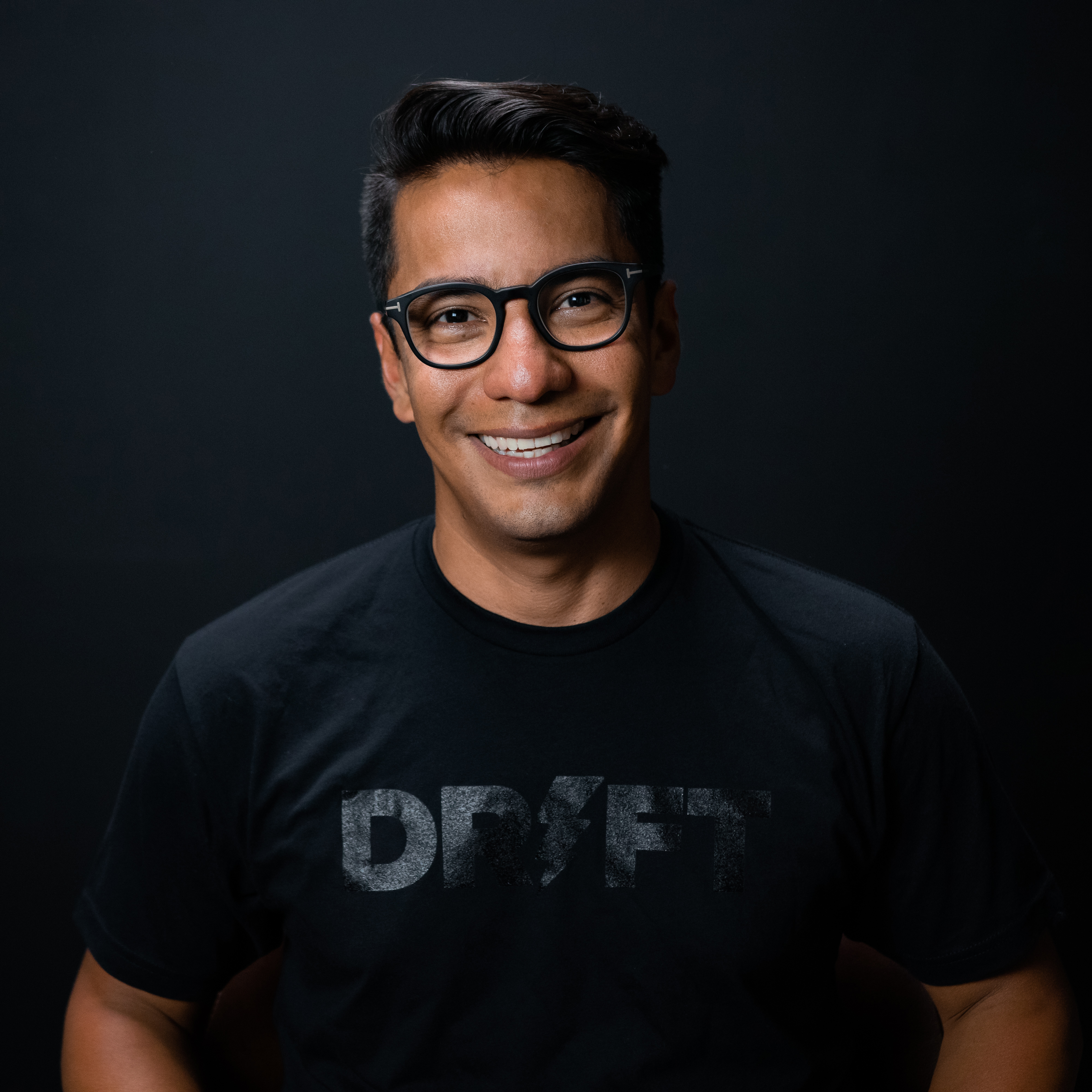
Elias Torres
Today's Guests
